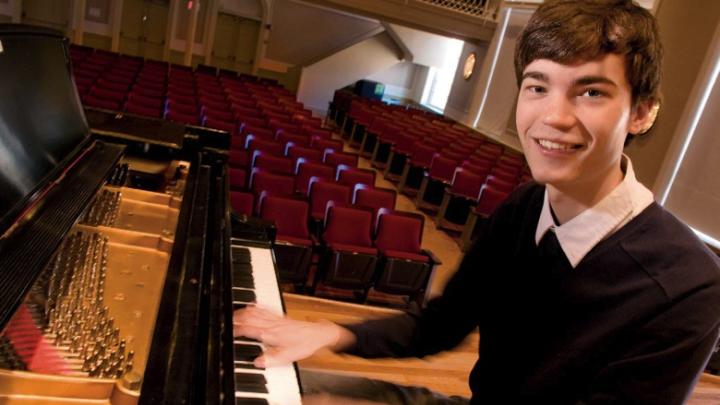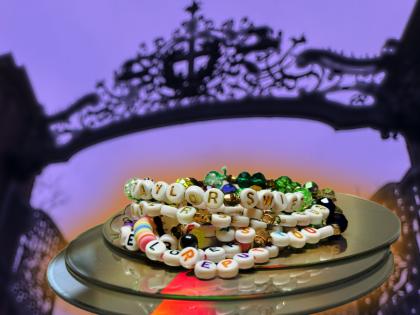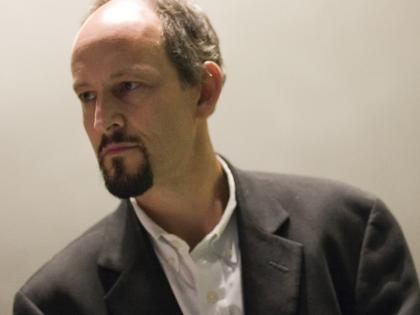The epiphany came early. Until middle school, Malcolm Campbell ’10 had been, well, another highly accomplished young pianist--he began learning the instrument at six and received solid classical training. But as a tween, Campbell happened upon three jazz piano recordings that changed his life: Oscar Peterson’s Night Train, Portrait in Jazz by Bill Evans, and Duke Ellington’s Piano Reflections. “Those three albums are the reason I’m playing jazz today,” Campbell says.
In fact, he’s playing a lot of jazz today, and playing it rather well. The Malcolm Campbell Quartet performs frequently in the Boston area and recently recorded its first CD, including four original compositions by Campbell (see www.malcolmcampbellmusic.com). He has played with a New England Conservatory (NEC) combo that jammed with saxophonist Lee Konitz at Boston’s Jordan Hall, and last year he played for Herbie Hancock when the jazz great came to Harvard.
Campbell practices three hours a day--and those hours fall inside the curriculum. He is part of the third class to enroll in a five-year, joint Harvard-NEC program: next year, he expects to earn his A.B. in chemistry and physics from Harvard and the year after, a master’s in music degree from NEC.
Those who play with him, like saxophonist Marcus G. Miller ’08, relish his keyboard stylings; Miller likes to describe Campbell as “the baddest man in America.” Jazz singer Dana Lauren, a Berklee College of Music student, sang with the young pianist last summer at the Aspen Jazz Festival. “From the first time we rehearsed together I was in awe,” she says. “I had been playing with guitarists because I couldn’t find a pianist I felt a connection with--someone who had the chops and emotional connection to the music. Malcolm never ceased to amaze me. Each time was a completely different experience and he never turned his ear away from what I was singing, which made some really powerful music.” Campbell agrees, noting that in jazz, “Your energy level is influenced by the person [soloist] who came before you.”
He draws on a classical-music analogy to explain that “a jazz trio, quartet, or quintet is like a small chamber group, and I’m enjoying the kind of interaction you get.” Even so, “I’ve never heard a classical pianist who sounded good in jazz,” he says. “With jazz, the rhythm is so important--getting it into your soul. It’s an insult to a jazz musician to say, ‘Your rhythm sounds like a classical musician trying to play jazz.’”
Indeed, rhythm powerfully drives Campbell’s approach. For him, nirvana is “playing with a really ridiculous bass and drummer who have the most solid swinging rhythm. The ecstasy you can get from a combo like that--they just light a fire in the room.”
Campbell continues to play classical works, partly because “Classical training addresses things that jazz training doesn’t address, like attention to tone quality and the subtlety of phrasing. You can pay attention to these things more easily when the notes are all written out. With jazz, there’s so much else to deal with--improvising is mostly about knowing what to play, rather than how you play it. But the best jazz musicians know what to play and how to play it.”
In his own jazz compositions, Campbell works at the most fundamental level of what to play. For example, the silky surface texture of “Snow” moves over shifting rhythmic cadences that segue from an unusual 7/4 meter into and out of other rhythms, all nuanced by Campbell’s characteristic syncopated accents. In the piece, “There are three sections that people solo over,” he explains. “Each has its own space and harmony.”
The Harvard-NEC program was the deciding factor in convincing Campbell to attend Harvard. “I needed to find a way of doing music seriously,” he says. “It keeps me in the Boston music scene, and I wouldn’t have met a lot of the people I play with otherwise. Plus, the teachers are at such a high level.” (Campbell has two jazz piano teachers at NEC, Panamanian Danilo Perez and Finn Frank Carlberg.) The musical life hasn’t hurt his work in chemistry and physics, either: Phi Beta Kappa elected Campbell to its Junior Eight this spring. He’s been doing research in the lab of assistant professor of chemistry and chemical biology and of physics Adam Cohen, using physical tools to probe biological systems.
When Campbell goes home to Lexington, Massachusetts, there’s another Harvard faculty member present: his father is Olshan professor of economics John Y. Campbell, who also sings and plays clarinet. Campbell’s mother, Susanna, is a psychiatric nurse who plays piano, flute, and harp. (Her father, Malcolm Peyton, for whom Campbell is named, is a classical composer on the NEC faculty.) Older brother Graham, who has Down syndrome, is a serious pianist and a student at Berkshire Hills Music Academy. (In late April, the two brothers played in a concert at Harvard as part of a Down syndrome awareness event.) Younger sister Naomi, 18, has played piano, clarinet, and bassoon, while 11-year-old Sophia sings and plays piano. The family jams together whenever possible.
Campbell hopes to have a performing career in jazz, maybe along with some teaching at a conservatory, “somewhere with an active music scene,” he says. “I’d just like to have a life where I’m doing music every day and feeling fulfilled.”








